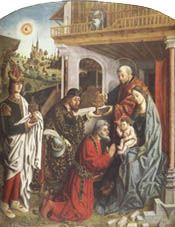Celebrating Christmas Home | Creighton University's Online Ministries

Celebrating Christmas Home | Creighton University's Online Ministries

|
Each day of the Christmas
season,
Lord, every nation on earth will adore you. |

|
|
He shall
rescue the poor when he cries out, |
The Second Week of Christmas On December 31th, we celebrate the Holy Family. In year A, the gospel the Flight into Egypt. In year B, the gospel is the Presentation in the temple. In year C, the gospel is the losing and finding of Jesus in the temple. The Feast of the Holy Family is often celebrated on the Sunday after Christmas. When a Sunday does not occur between December 25 and January 1, this feast is celebrated on December 30 with only one reading before the Gospel. What family or faith community can't benefit from reflecting upon the Holy Family? This is not the time to reflect upon a "perfect family," but to ask ourselves how we might be blessed to reflect upon Joseph, Mary and Jesus, and ask ourselves what graces they could offer us. And, this allows us a bit more time to reflect upon the Christmas story, including the everyday reality that was part of their lives as family - the patience, give and take, the self-sacrifice and the love that was a part of their very human interaction together, throughout what we call "the hidden life" of Jesus. That can include all the growing up years of Jesus' life, what their village was like and what ways they spoke with each other, as well as what difficulties they might have experienced. These are all great ways for us to contemplate this feast. We can imagine what Jesus learned from both Mary and Joseph that prepared him for his life of proclaiming the comingof the Reign of God. Finally, we can imagine the death of Joseph and the life of Mary and Jesus after his death. Monday, January 1st will be the Solemnity of Mary the Mother of God. It is also the World Day of Prayer for Peace. We celebrate the Epiphany, in a week or so. We can draw great fruit from reflecting upon the readings and prayers of the days before Epiphany or the days after Epiphany. This week we keep asking for the grace to celebrate his coming among us. Each of us can keep growing in a sense of freedom and joy over the gift we have been given to know God's love for us and presence with us more deeply. It is a week of gratitude. However, if our celebration of the days before Christmas and Christmas Day itself were busy or even difficult, then this can be days of recovery and added time to let Our Lord come into our lives where we need him to come. Next weekend, we celebrate the Epiphany - on January 6th in most of the world and on January 7th in the U.S. We can draw great fruit from reflecting upon the readings and prayers of the days before Epiphany or the days after Epiphany. But it is wonderful to pay attention to several themes throughout this week. The first letter of John fills this week with the language of God's love for us. This leads to simple, but deep, reflection on the love we must have for our brothers and sisters. The celebration of and preparation for Epiphany colors the week with images of light, and a number of themes related not only to revelation and seeing, but also to baptism itself. Throughout this week, we ask for graces and continue to celebrate with joy. This week we continue to reflect on the coming of our Lord among us. The week contains two celebrations of epiphanies. An epiphany is a showing, a revelation, a manifestation. The day we call the Feast of the Epiphany makes use of Matthew's account of the Magi, the wise seers from the East to whom are revealed the good news of our salvation. The Feast of the Baptism of the Lord represents another epiphany. When Jesus comes out of the water, which he enters to symbolize the completeness of his entry into our lives, a voice from heaven makes known to us who Jesus is: "My beloved Son." After all these years of waiting and longing, after all the promises and hopes, he is here - born into conflict, baptized in the Jordan - for us all. The other part of the process of revelation, of showing, of Epiphany, is the part where we observe, recognize, take it in, and receive the good news as it is given to us. When we receive the gift, the gift giving is complete. When we recognize the one revealed, the epiphany is accomplished. When we accept who God is for us in Jesus, we let the Spirit give life to our salvation. The continuing readings from the First Letter of John are perfect to grow in a sense of how loved we are and how we are called to love. The gospels this week manifest to us a Lord who is full of compassion, who feeds the hungry and heals the sick. This is a powerful way to end the Christmas season and, long after the wrapping paper is thrown away, to look back and give thanks for the real gifts we have received this year.
|